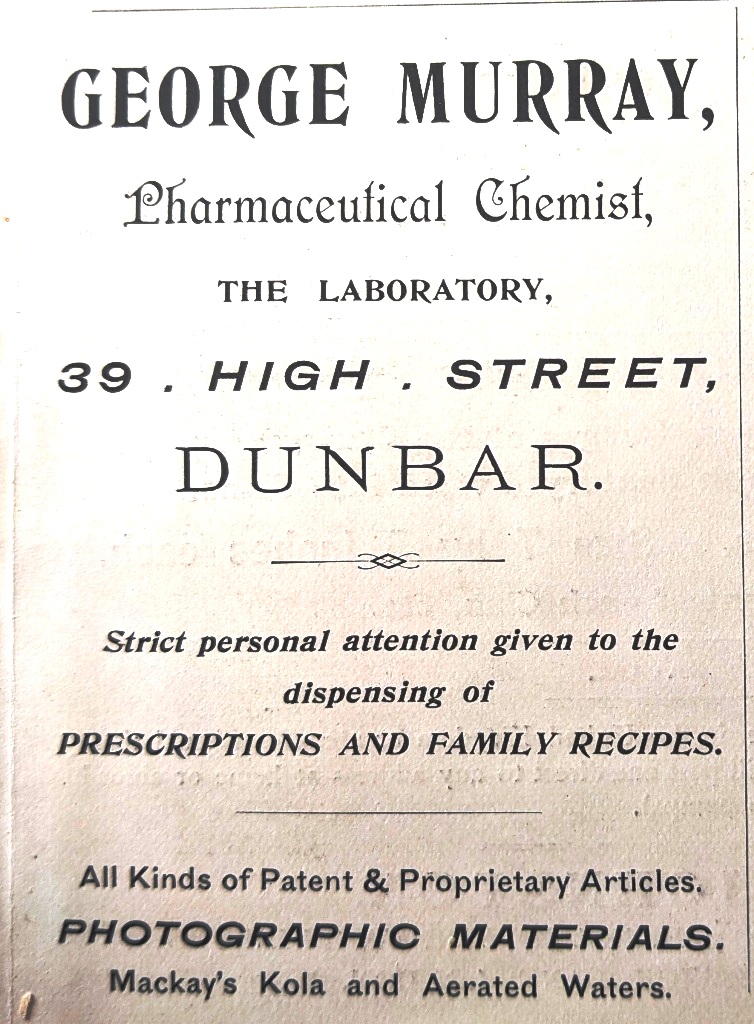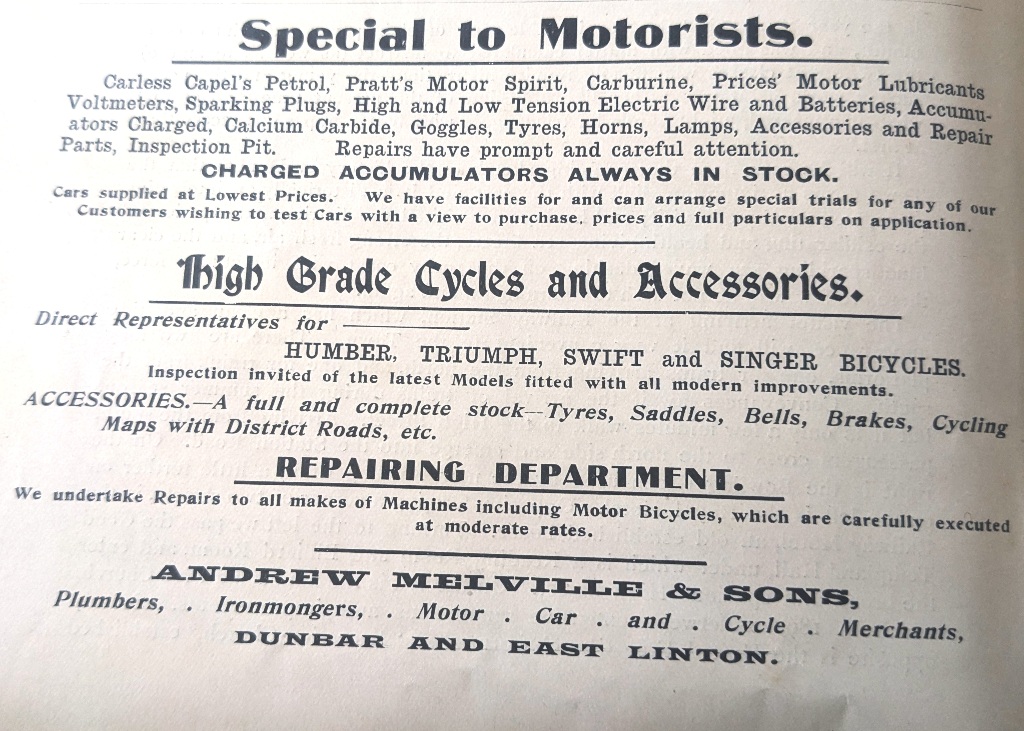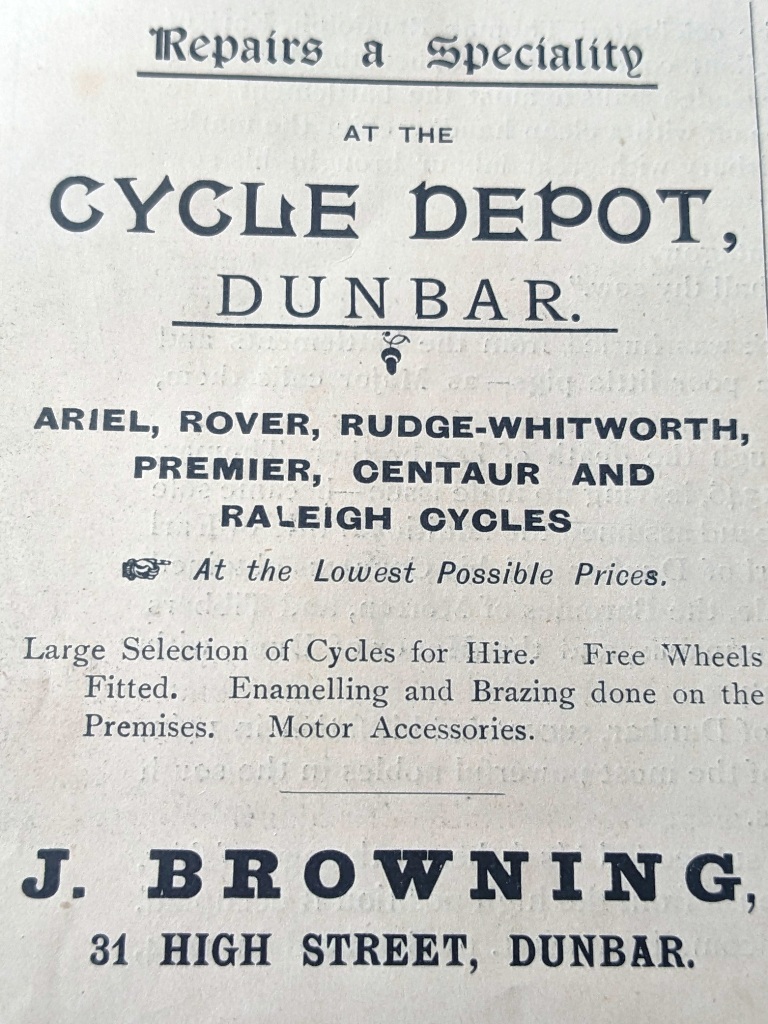May 2023
This month, we are going to look at some more adverts from Picturesque Dunbar, the tourist brochures sold in Dunbar in the late 1890s and early 1900s. Part 1 appeared on the website earlier this year. See here.
The photo below shows an advert for George Murray’s chemist shop at 39 High Street, now occupied by Garden, Stirling and Burnett. One of the interesting features of this advert is the High Street number is preceded by The Laboratory, presumably this referred to the mixing of chemicals to make up prescriptions. The advert also refers to Family Recipes alongside Prescriptions, and this historical site states that “Most of them [chemist shops] made their own potions and pills from scratch, experimenting with recipes in makeshift laboratories. Addictive substances such as opium and cannabis were used in cures”. So these family recipes may not have been as useful for curing ailments as they might appear. The site also shows an example of a tome entitled FAMILY RECIPE BOOK. As with other chemists at the time, the shop sold aerated waters and Murray’s sold Mackay’s Kola. You can see and advert for Mackay’s Sparkling Kola here – the company had a factory in Glasgow and also operated from Edinburgh and Newcastle-Upon-Tyne.

In the previous post for January 2023, an advert for Andrew Melville was included. The shop was at 114 and 116 High Street. Paris Steele is now at 116. This second advert (photo below) shows a wider range of service provided by Melville’s large shop. If you click on the photo, you will see that, in the enhanced version, Melville’s offerings to motorists (of whom there were few in the early 1900s) were extensive, with many products unfamiliar to use today. The first product mentioned is Carless Capel’s Petrol, which looks odd – Carless petrol? The Layers of London site states that “Eugene Carless founded a distilling and refining business in 1859 at Hackney Wick – the Hope Chemical Works – the leading refiner of American crude oil. 1895 saw the expansion by the purchase of the adjoining Pharos Chemical Works. He marketed his ‘motor spirit’ under the name ‘petrol’ which passed into common currency. Carless had a near monopoly of highly refined petrol nationally with 1,500 agents in 1906”. This is followed by Pratt’s Motor Spirit and the Anglo American Oil Company, which became Esso in the UK in 1934, marketed Pratt’s products. The History of Esso site states that “In 1905, King Edward VII granted a Royal Warrant to the company for the supply of ‘Pratt’s Perfection Motor Spirit’, and there were some 3,500 sales agents around the country offering the company’s wares”. When the company became Esso, the Pratt’s name was used until the 1950s.

Melville’s shop sold bikes i.e. High Grade Cycles and Accessories but they had a rival in Browning’s shop was situated at 31 High Street, where Drew Dodd’s Euronics (former Panasonic) shop is now. Ariel cycles were one of the best known in the UK at this time. This site states that “Ariel was a bicycle, motorcycle and car brand from Birmingham, whose adventure began in 1847. The first company product was a light bicycle which was given the name Ariel, meaning the Spirit of the Air. So, this name was kept for all the bicycles and sewing machines produced by the company from Birmingham”. You can see an Ariel advert for what we today would call an electric bike here. The Rudge-Whitworth cycles named in the advert were developed in early 1900s and you can see an early advert for these bikes here. Centaur cycles “were produced in Coventry roughly between 1875 and 1925. The company were known for their successful lightweight bicycles (the King of Scorchers, for instance, available from 1890, weighed only 26lb)” – see here for an advert. The Browning one below also refers to brazing which is defined as to “form, fix, or join by soldering with an alloy of copper and zinc at high temperature”. Bicycles were expensive at this time and only fairly affluent people would have afforded one. The mass producing of affordable bikes did not happen until much later in the 20th century.

You must be logged in to post a comment.